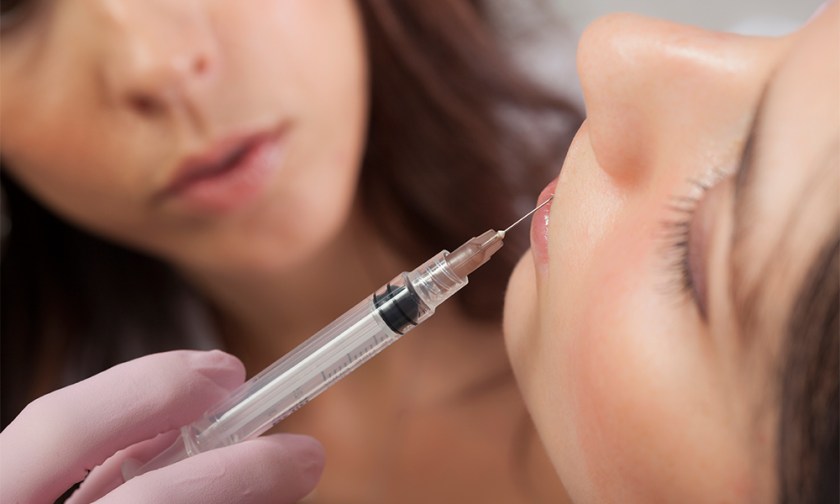If 2016 is the year you decide to grow your business by adding new services and practitioners, be careful who you let in. Your reputation – indeed, livelihood – could depend on it.
This is particularly important for salon, spa or clinic owners who want to offer clients anti-wrinkle and dermal filler injections by contracting doctors and/or nurses to perform these cosmetic medical procedures.
Cosmetic medicine is not only a science but an art form, and practitioners must be highly trained, qualified and skilled – and carry the appropriate insurance.
Choosing a medical professional to join your team should never be taken lightly, or their credentials on face value, as a case recently reported by The Sydney Morning Herald highlighted.
Chanelle O’Hare, 36, went to a beauty salon at Sydney’s Burwood Plaza in 2012 after seeing a special for dermal fillers on Living Social, a website offering discount deals across the lifestyle spectrum.
It was when the nurse finished injecting and told Chanelle that she would have to see a doctor for antibiotics and antihistamines to prevent infection that she realised something was seriously amiss.
As the old saying goes, if something sounds too good to be true … it usually is.
“She didn’t tell me what she was putting in my face and she didn’t show me any of the packages,” Chanelle told the SMH. “She only told me at the end that she’d given me a stronger filler so that it would last longer.”
Next morning Chanelle woke to find her lips bruised, severely infected and swollen to three times their normal size, making her face unrecognisable. A doctor had to lance her lips.
“I could not speak or go to work. I could not leave the house,” she said. “I went to therapy to help come to terms with the lasting impacts the procedure had on my physical and emotional wellbeing. It was traumatic looking in the mirror and not seeing my own face.”
According to the SMH, Chanelle later discovered the nurse was being investigated by the NSW Health Care Complaints Commission after it received similar complaints from other patients.
The commission heard that the nurse, who was working under the names Jenny Tran, Marie William and Thi Cuc Tran at operators in Burwood and Merrylands, had injected and supplied prescription-only medication without authorisation.
Ms Tran was permanently prohibited from providing injectable cosmetic treatments by the commission in 2014.
But Chanelle said there had been no justice after what happened to her: “She wasn’t insured so none of the patients could [get] compensation.”
The unfortunate client likely wasn’t the only victim. The salons in which the unethical nurse also worked would no doubt have suffered as a result.
You can’t put a price on good health, yet many consumers are still willing to risk it – and their looks – by signing up for cut price anti-wrinkle and dermal filler injections despite warnings they may be getting dangerous imitations bought online from dodgy sources.
“Buyer beware please!” says cosmetic physician Dr Catherine Porter, spokesperson for the Cosmetic Physicians College of Australasia (CPCA).
“If something is an amazing deal price-wise there is always a catch. And that catch may be non-TGA approved substances being injected into the face. A disaster waiting to happen.”
There are reasons neurotoxins such as Botox, Dysport and Xeomin and dermal fillers under brand names like Restalyne and Juvederm don’t come particularly cheaply:
- Injectables are medical procedures with strict protocols to be observed for the protection of all involved.
- The injectable products are listed as Schedule 4 medications under the Poisons and Therapeutic Goods Act 1966 (NSW). This means they must be administered by, or under the supervision of medical practitioners.
- They are the result of years of rigorous scientific research and testing, and have had to jump through myriad hoops to be approved/registered by official supervisory bodies such as the US Food and Drug Administration (FDA) and Australia’s Therapeutic Goods Administration (TGA).
The Australasian College of Cosmetic Surgery (ACCS) has similarly warned against giving cosmetic procedures as gifts, whether to one’s self or others.
College president Dr Ron Bezic said that with beach/holiday season upon us “it is normal that people are more conscious of creases, sags and bulges and some may be looking for a quick fix or shortcut to what they perceive as an ‘ideal’ body.
“It is important to do your homework before going ahead.”
This homework is just as (arguably even more) important for business owners providing such procedures than for the consumers themselves.
The ACCS says it is concerned that people are jumping into procedures without taking the time to think about the consequences – particularly common with cheap deals and coupons for cosmetic procedures being offered online.
The Australian Society of Plastic Surgeons (ASPS) is concerned that an estimated one in four people don’t check surgeon’s credentials and are urging Australians to think very carefully before committing to cosmedical procedures, whether in Australia or overseas, and inform themselves of all possible risks and possible consequences with a campaign launched last year: Think Over Before You Make Over.
“Our message is literally to think over before you make over,” says ASPS President, Dr Tony Kane.
“Additionally, ASPS is calling for regulations to mandate a minimum 14 day cooling off period after the initial consultation, arguing the seven-day cooling off period in the Medical Board of Australia’s draft recommendations on cosmetic surgery regulation doesn’t go far enough.
“Alarmingly some people seem to spend more time researching a new hairdresser than they do their surgeon and rush into surgery they later regret.
“We are concerned that increasing numbers of Australians are having cosmetic procedures without fully understanding the potential risks and, importantly, without properly investigating the qualifications of the person undertaking their procedure or the facility in which it’s being conducted.
“Despite a growing number of reports in the media of poor or disastrous outcomes, and sadly, even deaths, people are still rushing into cosmetic surgery with little consideration for their safety, often putting financial considerations ahead of their health.
“Since 2011, ASPS’ code of conduct has included a 10-day cooling off period. However, we’d like to see the medical board go even further and implement a 14-day cooling off period.
“This is a global issue. Cosmetic surgery can have life-changing benefits for many people and more and more people will choose to take up this option but we urge them to make informed choices. People need to understand that cosmetic surgery is not trivial.
“It is serious, invasive surgery requiring anaesthetic and, like any other surgery, involving an element of risk.” 
Consumers need to be abreast of the risks of all cosmetic medical procedures, some of which include allergic reactions, muscle weakness, shortness of breath, swelling or drooping of the face, and paralysis. Even death.
Dr Mariusz Gajewski, from Star Cosmetic Medicine in Sydney’s Pyrmont, told the SMH he believes people are so casual about treatments because they have “developed the perception that it is risk-free.
“They talk about having their lips enhanced the same way they would talk about a haircut. Adverse events can happen even in skilled hands, but an experienced doctor or nurse will be able to reduce the likelihood and treat them.”
Adds leading Sydney cosmetic physician Dr Naomi McCullum: “Injectors need to know their facial anatomy and where the more risky sites for injecting are, and how to reduce the risk of complications.
“We’re not talking about temporary bruising or swelling here. Blindness, although rare [a risk when injecting around the eye area], would be devastating.
“Patients need to be aware of the risks, and weigh them against the benefits. This will help them decide whether going ahead with the procedure is right for them.”
So as a business owner you must not only have a sound understanding of the laws to abide by when offering injectables as part of your service but the qualifications, expertise and experience of the doctor or nurse you are bringing into your business.
Last year SPA+CLINIC was told of a clinic owner who engaged the services of a doctor to perform injectables only to discover – just in time – that the doctor was no longer licenced to practise.
“A spa or clinic owner should check out the doctor’s CV and assess where the training has taken place and what that training has been,” says Dr John Flynn, censor in chief of the ACCS.
“You cannot just accept that because they have a medical degree they are automatically across the injectables arena and it certainly does not necessarily mean they are skilled.
“The college would advise to see if the doctor is a member of the ACCS or one of the other professional groups within the discipline of cosmetic medical practice.”
Registered nurses are legitimately able to inject anti-wrinkle preparations and dermal fillers.
However, because these are scheduled (ie. restricted) products they must be prescribed by a doctor and a client must first been seen by a doctor to ensure their health, fitness and suitability for the procedure and TO work out an appropriate treatment plan.
The registered nurse involved in the treatment needs to have current registration, adequate training in the procedure and the prescribing doctor needs to be satisfied with his/her qualifications.
“Under Australian law and Medical Board guidelines, nurses are not permitted to administer such treatments unless supervised by a doctor,” says CPCA’s Dr Porter.
“The prescribing doctor needs to provide written instructions or orders and supervise the treatment administered by the registered nurse.”
COSMETICPHYSICIANS.ORG.AU; ACCS.ORG.AU; DRNAOMI.COM.AU; STARCOSMETICMEDICINE.COM.AU




